History
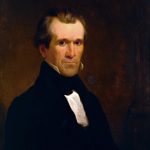 I was looking at a fact site last night, and found a list of unusual facts about the presidents of the United States. While the facts about each president were everything from strange, to bizarre, to amazing, I found myself drawn to what I read about James K Polk, who happens to be the 2nd cousin 1x removed of the husband of my 5th cousin 2x removed. That sounds very confusing to people, and I can say that it is confusing to me too. Nevertheless, my family and my husband, Bob’s family trees are intertwined, and that is a fact I have known for a while now. James Polk is just another in the line of people we are both connected to. Those are the facts I knew about James K Polk…as well as, the fact that his middle name is Knox and that is how he is related to Bob’s side of our family. My own connection comes from the Allen side of my dad’s family…and that I did not know before.
I was looking at a fact site last night, and found a list of unusual facts about the presidents of the United States. While the facts about each president were everything from strange, to bizarre, to amazing, I found myself drawn to what I read about James K Polk, who happens to be the 2nd cousin 1x removed of the husband of my 5th cousin 2x removed. That sounds very confusing to people, and I can say that it is confusing to me too. Nevertheless, my family and my husband, Bob’s family trees are intertwined, and that is a fact I have known for a while now. James Polk is just another in the line of people we are both connected to. Those are the facts I knew about James K Polk…as well as, the fact that his middle name is Knox and that is how he is related to Bob’s side of our family. My own connection comes from the Allen side of my dad’s family…and that I did not know before.
James K Polk was the first president to be elected under the age of 50, and the youngest to die, with the exception of Garfield and Kennedy, both of whom were assassinated. Polk had surgery at the age of 17, to remove stones from his bladder. This was before anesthesia was invented, so he was awake for the entire 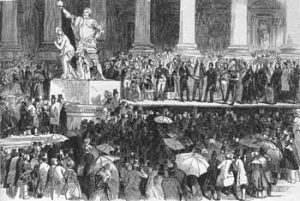 procedure. I can’t imagine how painful that must have been. Polk is the only Speaker of the US House of Representatives to become President of the United States. His years as president were active ones. They saw three states added to the nation, the first Women’s Rights Convention was held, the sewing machine, gas lighting, and the rotary printing press were invented, and the Gold Rush began. Polk was a highly motivated president, and it is believed that he worked so hard while serving as president that he weakened himself, causing his death shortly after leaving office.
procedure. I can’t imagine how painful that must have been. Polk is the only Speaker of the US House of Representatives to become President of the United States. His years as president were active ones. They saw three states added to the nation, the first Women’s Rights Convention was held, the sewing machine, gas lighting, and the rotary printing press were invented, and the Gold Rush began. Polk was a highly motivated president, and it is believed that he worked so hard while serving as president that he weakened himself, causing his death shortly after leaving office.
Polk had just two years of formal schooling prior to entering the University of North Carolina as a sophomore. He was a member of a debating society in college, and he found that he had an interest in law and government. Polk graduated with top honors in mathematics and the classics. Then he returned home to Tennessee to become a lawyer. To receive legal training, he worked in the office of Nashville trial attorney, Felix Grundy and then served as clerk of the Tennessee Senate. Polk was diligent and ambitious, and soon 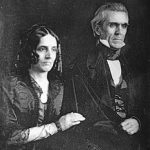 established a law practice in Columbia, Tennessee. At 27 years of age, Polk’s interests turned to politics, and he defeated an incumbent for a seat in the Tennessee Legislature. During his time as state representative, he met and eventually married Sarah Childress, who was the very intelligent daughter of a Murfreesboro merchant. She was well educated and her social grace impressed their peers. She became her husband’s personal and political confidant, it was her involvement in his campaigns that helped to ensure his victories. Fervently supporting the policies of fellow Tennessee Democrat Andrew Jackson, Polk was elected to the United States Congress at 29. His Congressional career lasted 14 years and included two terms as Speaker of the House. He must have been well liked to then go on the become President of the United States as well.
established a law practice in Columbia, Tennessee. At 27 years of age, Polk’s interests turned to politics, and he defeated an incumbent for a seat in the Tennessee Legislature. During his time as state representative, he met and eventually married Sarah Childress, who was the very intelligent daughter of a Murfreesboro merchant. She was well educated and her social grace impressed their peers. She became her husband’s personal and political confidant, it was her involvement in his campaigns that helped to ensure his victories. Fervently supporting the policies of fellow Tennessee Democrat Andrew Jackson, Polk was elected to the United States Congress at 29. His Congressional career lasted 14 years and included two terms as Speaker of the House. He must have been well liked to then go on the become President of the United States as well.
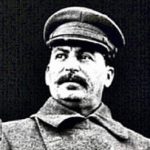
 Over the years, people have trained dogs to perform many tasks that were too dangerous for their human counterparts…knowing that the very act of doing their duty would likely cost the dog its life. I think many of us would be sickened by the things these loyal animals went through, but I suppose that in the eyes of their trainers, they were heroes. During World War II, Joseph Stalin approved the use of “canine killers” to fight against German tanks. I think that in most ground wars, the tank is probably the most dreaded weapon there is. In many ways, it is like fighting a robot…it’s almost impossible to kill. The tanks could go right into the middle of the battle, and in fact, right over the people in front of them. They could also shoot from a distance. They were a major weapon against the ground troops. Stalin wanted a weapon to use against them, and decided that the dogs were just the right weapon.
Over the years, people have trained dogs to perform many tasks that were too dangerous for their human counterparts…knowing that the very act of doing their duty would likely cost the dog its life. I think many of us would be sickened by the things these loyal animals went through, but I suppose that in the eyes of their trainers, they were heroes. During World War II, Joseph Stalin approved the use of “canine killers” to fight against German tanks. I think that in most ground wars, the tank is probably the most dreaded weapon there is. In many ways, it is like fighting a robot…it’s almost impossible to kill. The tanks could go right into the middle of the battle, and in fact, right over the people in front of them. They could also shoot from a distance. They were a major weapon against the ground troops. Stalin wanted a weapon to use against them, and decided that the dogs were just the right weapon.
The dogs, usually Alsatians, called “Hundminen” or “dog mines” were trained by the Russians to run under German tanks, at which point the bomb strapped to their backs would explode, destroying the tank…and the dog too, of course. The dogs were going to be their secret weapon, but there was just one problem, at least with the first batch of Kamikaze Dog trainees. The dogs had been trained with Soviet tanks, not German ones. Soviet and German tanks used different types of fuel, and some of the dogs sniffed out the fuel they were used to and trotted off to blow up the tanks used by the very military that trained them. I’m sure that must have been quite a shock to their trainers. The dogs were initially trained to transport explosives to tanks, armored vehicles and other various targets, and then retreat before the bomb exploded, but when that didn’t work well, the routine was replaced by impact detonation, which resulted in the dog’s death. The training began in 1930, and whether they were useful or not the dogs were used in battle. Kamikaze Dogs started to be used less and less from 1942 onwards, though there were Kamikaze Dogs that continued to be trained until 1996.
I find myself feeling horrified by the picture this practice paints. Dogs are usually very loyal, and all they want to do is please their master. They trust their master, or in this case, their trainer, only to be rewarded with 
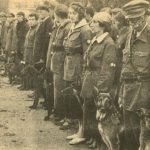 death. I’m sure that the Russians eventually got the dogs to the point where they recognized the right targets, or the practice wouldn’t have continued until about 1990. The Soviets have said that about 300 tanks had been destroyed by Kamikaze Dogs, but that number has been questioned by many. Most people think the number was probably made up by the Soviet government in an effort to justify the program, and particularly to justify killing so many dogs with so few results. What a horrible practice.
death. I’m sure that the Russians eventually got the dogs to the point where they recognized the right targets, or the practice wouldn’t have continued until about 1990. The Soviets have said that about 300 tanks had been destroyed by Kamikaze Dogs, but that number has been questioned by many. Most people think the number was probably made up by the Soviet government in an effort to justify the program, and particularly to justify killing so many dogs with so few results. What a horrible practice.
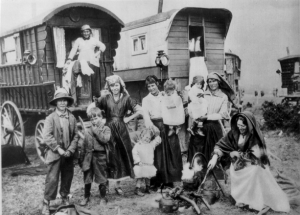 When we think of the horrors of the Holocaust, we think of millions of Jewish people who were murdered because they were Jewish. The horrible things Hitler did are so awful, that most of us can hardly bare to think about it at all. It is uncertain just when the Holocaust began, but the accepted date is January 30, 1933. That date is when Adolf Hitler was appointed German chancellor, setting in motion what would become the Nazi genocide against the Jews. On September 15, 1935, the Nuremberg Laws were enacted. The Nuremberg Laws were anti-Jewish statutes enacted by Germany, that were a major step in clarifying racial policy and removing Jewish influences from Aryan society. These laws, were the foundation on which the rest of Nazi racial policy hung.
When we think of the horrors of the Holocaust, we think of millions of Jewish people who were murdered because they were Jewish. The horrible things Hitler did are so awful, that most of us can hardly bare to think about it at all. It is uncertain just when the Holocaust began, but the accepted date is January 30, 1933. That date is when Adolf Hitler was appointed German chancellor, setting in motion what would become the Nazi genocide against the Jews. On September 15, 1935, the Nuremberg Laws were enacted. The Nuremberg Laws were anti-Jewish statutes enacted by Germany, that were a major step in clarifying racial policy and removing Jewish influences from Aryan society. These laws, were the foundation on which the rest of Nazi racial policy hung.
The Jewish people were not the only group of people who came to the attention of Hitler’s insane mind either. Under the rule of Adolf Hitler, a supplementary decree to the Nuremberg Laws was issued on November 26, 1935, defining Gypsies as “enemies of the race-based state”, the same category as Jews. The Nuremberg racial 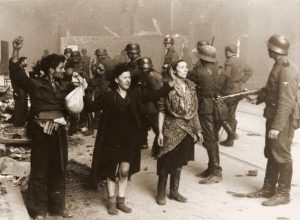 laws of September 15, 1935, “Law for the Protection of German Blood and Honor” and “Reich Citizenship Law” did not explicitly mention Gypsies, but in commentaries interpreting these laws, “Gypsies were included, along with Jews and Negros, as racially distinctive minorities with alien blood. As such, their marriage to Aryans was prohibited.” Like the Jews, the Gypsies were also deprived of their civil rights. Hitler viewed Jews and Gypsies as a defective race, in fact he viewed all non-white people as defective. I suppose this view was what originally justified Hitler’s brutal murder of 6 million Jews and who knows how many people of other races. On this day, November 15, 1943, Heinrich Himmler, who was the Reichsführer of the Schutzstaffel (Protection Squadron, or SS), and a leading member of the Nazi Party (NSDAP) of Nazi Germany ordered that Gypsies and those of mixed Gypsy blood are to be put on “the same level as Jews and placed in concentration camps.”
laws of September 15, 1935, “Law for the Protection of German Blood and Honor” and “Reich Citizenship Law” did not explicitly mention Gypsies, but in commentaries interpreting these laws, “Gypsies were included, along with Jews and Negros, as racially distinctive minorities with alien blood. As such, their marriage to Aryans was prohibited.” Like the Jews, the Gypsies were also deprived of their civil rights. Hitler viewed Jews and Gypsies as a defective race, in fact he viewed all non-white people as defective. I suppose this view was what originally justified Hitler’s brutal murder of 6 million Jews and who knows how many people of other races. On this day, November 15, 1943, Heinrich Himmler, who was the Reichsführer of the Schutzstaffel (Protection Squadron, or SS), and a leading member of the Nazi Party (NSDAP) of Nazi Germany ordered that Gypsies and those of mixed Gypsy blood are to be put on “the same level as Jews and placed in concentration camps.”
Hitler’s decision to include the Gypsies, and the ensuing murders of up to 500,000 Romani Gypsies, became known as the Romani Holocaust, or Porajmos, which means cutting, fragmentation, or destruction; or 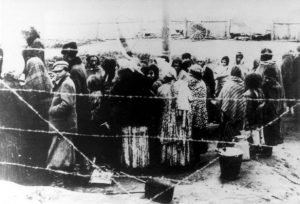 Samudaripen, which means mass killing. It was Nazi Germany and its allies planned and attempted effort to exterminate the Romani Gypsy people of Europe. Some historians put the death toll as high as 1.5 million. In 1982, West Germany formally recognized that genocide had been committed against the Romani. In 2011 the Polish Government passed a resolution for the official recognition of August 2nd as a day of commemoration of the genocide. As I was researching this horrific genocide, I began to wonder how it was that I had never heard about it before. Was I living under a rock? In reality, I doubt if it was in any of the history books of my time, because no one admitted that it happened until 1982, at the earliest.
Samudaripen, which means mass killing. It was Nazi Germany and its allies planned and attempted effort to exterminate the Romani Gypsy people of Europe. Some historians put the death toll as high as 1.5 million. In 1982, West Germany formally recognized that genocide had been committed against the Romani. In 2011 the Polish Government passed a resolution for the official recognition of August 2nd as a day of commemoration of the genocide. As I was researching this horrific genocide, I began to wonder how it was that I had never heard about it before. Was I living under a rock? In reality, I doubt if it was in any of the history books of my time, because no one admitted that it happened until 1982, at the earliest.
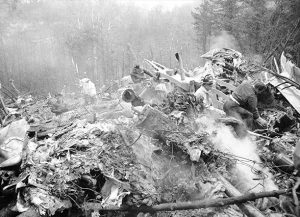
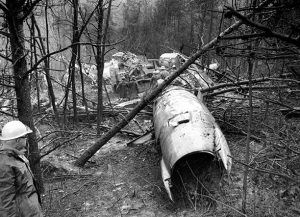 When a disaster strikes, we often see whole cities affected by the event. Rebuilding takes years, and the emotional scars might never heal. Plane crashes, while a disastrous event, seldom affect an entire town, not even if the plane crashed in the town. Those affect the people who saw the crash, rushed in to help the survivors, and cleaned up the aftermath…usually. That was not the case on November 14, 1970, when a charter plane carrying most of the Marshall University football team clipped a stand of trees and crashed into a hillside just two miles from the Tri-State Airport in Kenova, West Virginia. The team was returning from that day’s game, a 17-14 loss to East Carolina University. The investigators found that the plane was to the right of the correct approach corridor, and that is why they clipped the trees. Nevertheless, the plane crashed killing thirty seven Marshall football players, the team’s coach, its doctors, the university athletic director and 25 team boosters members, who were some of Huntington, West Virginia’s most prominent citizens, and had traveled to North Carolina to cheer on the Thundering Herd. One of the citizens of the town of Huntington later wrote that “the whole fabric, the whole heart of the town was aboard.”
When a disaster strikes, we often see whole cities affected by the event. Rebuilding takes years, and the emotional scars might never heal. Plane crashes, while a disastrous event, seldom affect an entire town, not even if the plane crashed in the town. Those affect the people who saw the crash, rushed in to help the survivors, and cleaned up the aftermath…usually. That was not the case on November 14, 1970, when a charter plane carrying most of the Marshall University football team clipped a stand of trees and crashed into a hillside just two miles from the Tri-State Airport in Kenova, West Virginia. The team was returning from that day’s game, a 17-14 loss to East Carolina University. The investigators found that the plane was to the right of the correct approach corridor, and that is why they clipped the trees. Nevertheless, the plane crashed killing thirty seven Marshall football players, the team’s coach, its doctors, the university athletic director and 25 team boosters members, who were some of Huntington, West Virginia’s most prominent citizens, and had traveled to North Carolina to cheer on the Thundering Herd. One of the citizens of the town of Huntington later wrote that “the whole fabric, the whole heart of the town was aboard.”
It had been a rough decade for the Thundering Herd. Their stadium had been condemned in 1962. It hadn’t been renovated since World War II. From the last game of the 1966 season, the team had not won a game. There had been some issues concerning recruiting violations as well, but the team seemed to be getting back on track. Dishonest coaches had been fired, the field had been rebuilt and they started winning games again. The loss to East Carolina was a real squeaker, and the team was looking forward to a better year the next season. Then disaster struck. For Huntington, the plane crash was “like the Kennedy assassination,” one citizen remembers. “Everybody knows where they were and what they were doing when they heard the news.” The town was in mourning. Shops closed, and windows were draped in black. The university held a memorial service and cancelled the Monday classes. The funerals seemed endless, taking place over the next few weeks. Everyone in town knew these people. Perhaps the saddest ceremony, was that of six players whose remains couldn’t be identified. They were buried together in Spring Hill Cemetery, on a hill overlooking their university.
Marshall got a new football coach…Jack Lengyel, from the College of Wooster in Ohio, who set about rebuilding the team. As a rule, Freshmen are not allowed to play on the Varsity squad, but Marshall was given special permission. Lengyel put together a mix of first year walk ons, and nine veteran players who had not been on the plane that night. It was a long road. The team lost the first game of the 1971 season, but in what seemed to be a miracle, they won their first home game against Ohio’s Xavier University 15-13, with a last second touchdown that seemed almost too good to be true. The team only won one other game that first season. During Lengyel’s four year tenure, they won nine other games, but none of those were as emotional as the first one. It was like they were playing for those who were lost, and maybe they were, or maybe it was because 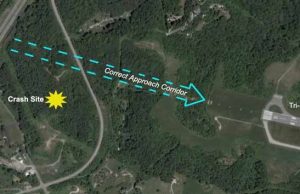
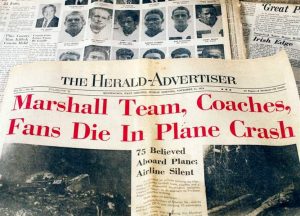 they were playing at home. No matter what happened in the remaining years of Lengyel’s tenure, the town would never forget how he brought the sport out of the ashes and brought hope back to the town. It wasn’t that football was all they had, or even that it could remotely compare to the loss the town had experienced, but I think it was more about honoring those lost, by not giving up. Those lost were not quitters, nor were those who remained.
they were playing at home. No matter what happened in the remaining years of Lengyel’s tenure, the town would never forget how he brought the sport out of the ashes and brought hope back to the town. It wasn’t that football was all they had, or even that it could remotely compare to the loss the town had experienced, but I think it was more about honoring those lost, by not giving up. Those lost were not quitters, nor were those who remained.
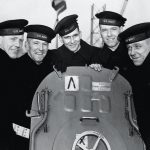 These days, it is rare to have siblings serving on the same post…much less the same ship. Nevertheless, it was a practice that did take place in the past. In fact, in the case of the USS Juneau, five brothers were all serving together on the ship. It was the height of World War II, and it was imperative that every available man was out there fighting. The Sullivan brothers, Francis Henry, George Thomas, Joseph Eugene, Madison Abel, and Albert Leo enlisted in the navy on January 3, 1942, with the stipulation that they all serve together on the same ship. The Navy had a policy of separating siblings, but this was not strictly enforced. Two brothers, George and Frank had served in the Navy before, but their brothers had not. All five were assigned to the light cruiser USS Juneau.
These days, it is rare to have siblings serving on the same post…much less the same ship. Nevertheless, it was a practice that did take place in the past. In fact, in the case of the USS Juneau, five brothers were all serving together on the ship. It was the height of World War II, and it was imperative that every available man was out there fighting. The Sullivan brothers, Francis Henry, George Thomas, Joseph Eugene, Madison Abel, and Albert Leo enlisted in the navy on January 3, 1942, with the stipulation that they all serve together on the same ship. The Navy had a policy of separating siblings, but this was not strictly enforced. Two brothers, George and Frank had served in the Navy before, but their brothers had not. All five were assigned to the light cruiser USS Juneau.
I stumbled upon the story of the five Sullivan brothers on the Find a Grave site while looking for disaster losses. Every time I have found numerous deaths in the same family, I have been surprised and shocked. Mostly, they have occurred because of some illness like typhoid fever, the plague, or some other illness, and those are all really sad, especially when it is a disease we can cure now. This was different, however. The Sullivan brothers were 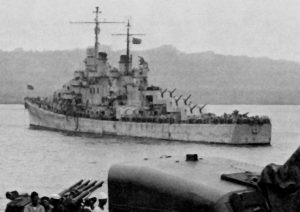 not sick…there was no epidemic, this was war. This simply a demonstration of why brothers were not normally on the same ship.
not sick…there was no epidemic, this was war. This simply a demonstration of why brothers were not normally on the same ship.
The Juneau engaged in a number of battles during the months of the Guadalcanal Campaign which began in August 1942. Early in the morning of November 13, 1942, during the Naval Battle of Guadalcanal. The Juneau was struck by a Japanese torpedo and forced to withdraw. Later that day, it was leaving the Solomon Islands’ area for the Allied rear area base at Espiritu Santo with other surviving United States warships, when the Juneau was struck again, this time by a torpedo from Japanese submarine I-26. The torpedo most likely hit the thinly armored light cruiser at or near the ammunition magazines and the ship exploded and quickly sank. The Helena and San Francisco, who were also in the area, but they had assumed that there were no survivors, and quickly departed without attempting to rescue any of the survivors.
More than 100 sailors survived the sinking of Juneau, but they were left to fend for themselves in the open ocean for eight days before rescue aircraft finally arrived. While awaiting rescue, all but 10 died from the elements and shark attacks, including the five Sullivan brothers. Two of the brothers apparently 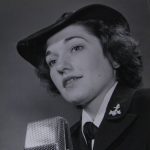 survived the sinking, only to die in the water. Two others presumably went down with the ship. Some reports indicate the fifth brother also survived the sinking, but disappeared during the first day in the water. On 20 November 1942, USS Ballard recovered two of the ten survivors. They were found in separate rafts, five miles apart. One of the survivors recovered by Ballard stated he had been with one of the Sullivan brothers for several days after the sinking. In that one day, Thomas and Alleta Abel Sullivan, lost all five of their sons. They were left only with their daughter, Genevieve Marie Sullivan Davidson. Their other daughter, Kathleen Sullivan had died at birth. Amazingly, daughter Genevieve decided to serve in the Navy too, as a Wave. While she survived her service, I’m sure her parents, while proud of her, were tormented by her decision.
survived the sinking, only to die in the water. Two others presumably went down with the ship. Some reports indicate the fifth brother also survived the sinking, but disappeared during the first day in the water. On 20 November 1942, USS Ballard recovered two of the ten survivors. They were found in separate rafts, five miles apart. One of the survivors recovered by Ballard stated he had been with one of the Sullivan brothers for several days after the sinking. In that one day, Thomas and Alleta Abel Sullivan, lost all five of their sons. They were left only with their daughter, Genevieve Marie Sullivan Davidson. Their other daughter, Kathleen Sullivan had died at birth. Amazingly, daughter Genevieve decided to serve in the Navy too, as a Wave. While she survived her service, I’m sure her parents, while proud of her, were tormented by her decision.
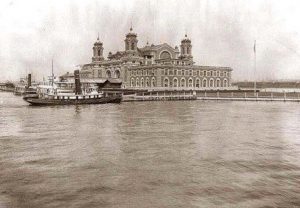 A number of my ancestors came to America during and prior to the years that Ellis Island was the processing center in New York. I have no doubt that some of them came through Ellis Island, but I have not confirmed that. I find many of the names in my tree, but while many of the ancestors I have found came over by way of New York, it would appear that my direct line arrived in America before the immigration center at Ellis Island opened on January 2, 1892. Before that time, immigrants were handled by the individual states where the immigrant first arrived. It is estimated that about 40% of Americans can trace their roots through Ellis Island, so while I see many familiar names, they may or may not be my direct line, and in fact, they might not be related at all.
A number of my ancestors came to America during and prior to the years that Ellis Island was the processing center in New York. I have no doubt that some of them came through Ellis Island, but I have not confirmed that. I find many of the names in my tree, but while many of the ancestors I have found came over by way of New York, it would appear that my direct line arrived in America before the immigration center at Ellis Island opened on January 2, 1892. Before that time, immigrants were handled by the individual states where the immigrant first arrived. It is estimated that about 40% of Americans can trace their roots through Ellis Island, so while I see many familiar names, they may or may not be my direct line, and in fact, they might not be related at all.
Ellis Island is located in New York Harbor off the New Jersey coast and was named for merchant Samuel Ellis, who owned the land in the 1770s. The island was given the nickname, The Gateway to America because more than 12 million immigrants passed through the center since it opened in 1892. On January 2, 1892, 15 year old Annie Moore, from Ireland, became the first person to pass through the newly opened Ellis Island, which President Benjamin Harrison designated as America’s first federal immigration center in 1890. Oddly, not all 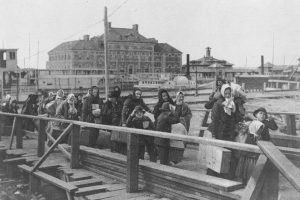 immigrants who sailed into New York had to go through Ellis Island. First and second class passengers were just given a brief shipboard inspection and then disembarked at the piers in New York or New Jersey, where they passed through customs. People in third class, though, were transported to Ellis Island, where they underwent medical and legal inspections to ensure they didn’t have a contagious disease or some condition that would make them a burden to the government. Nevertheless, only two percent of all immigrants were denied entrance into the United States. The peak years of immigration through Ellis Island were from 1892 to 1924. The 3.3 acre island was enlarged by landfill, and by the 1930s, it had reached its current size of 27.5 acres. After the extra size was completed, new buildings were constructed to handle the massive influx of people coming to America for a better life. During it’s busiest year, which was 1907, over 1 million people were processed through Ellis Island.
immigrants who sailed into New York had to go through Ellis Island. First and second class passengers were just given a brief shipboard inspection and then disembarked at the piers in New York or New Jersey, where they passed through customs. People in third class, though, were transported to Ellis Island, where they underwent medical and legal inspections to ensure they didn’t have a contagious disease or some condition that would make them a burden to the government. Nevertheless, only two percent of all immigrants were denied entrance into the United States. The peak years of immigration through Ellis Island were from 1892 to 1924. The 3.3 acre island was enlarged by landfill, and by the 1930s, it had reached its current size of 27.5 acres. After the extra size was completed, new buildings were constructed to handle the massive influx of people coming to America for a better life. During it’s busiest year, which was 1907, over 1 million people were processed through Ellis Island.
When the United States entered into World War I, immigration to the United States decline, most likely because travel anywhere was risky. Ellis Island was used as a detention center for suspected enemies during that time. Following the war, Congress passed quota laws and the Immigration Act of 1924, which sharply reduced the number of newcomers allowed into the country and also enabled immigrants to be processed at United States  consulates abroad. The act also enabled immigrants to be processed at United States consulates abroad, making detention at Ellis Island obsolete. After 1924, Ellis Island switched from a processing center to other purposes, such as a detention and deportation center for illegal immigrants, a hospital for wounded soldiers during World War II and a Coast Guard training center. In November 1954, the last detainee, a Norwegian merchant seaman, was released and Ellis Island officially closed on November 12, 1954. In 1984, Ellis Island underwent a $160 million renovation, the largest historic restoration project in United States history. In September 1990, the Ellis Island Immigration Museum opened to the public and is visited by almost 2 million people each year.
consulates abroad. The act also enabled immigrants to be processed at United States consulates abroad, making detention at Ellis Island obsolete. After 1924, Ellis Island switched from a processing center to other purposes, such as a detention and deportation center for illegal immigrants, a hospital for wounded soldiers during World War II and a Coast Guard training center. In November 1954, the last detainee, a Norwegian merchant seaman, was released and Ellis Island officially closed on November 12, 1954. In 1984, Ellis Island underwent a $160 million renovation, the largest historic restoration project in United States history. In September 1990, the Ellis Island Immigration Museum opened to the public and is visited by almost 2 million people each year.
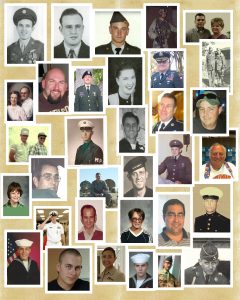 In times of war, and even in times of peace, there is a group of people who stand always at the ready…prepared to go at a moments notice, into battle to defend this country and the freedoms we enjoy. They are not always treated in the way they should be treated. It’s incomprehensible to me that we can ask these men and women to protect us in times of trouble, and then protest them when we don’t like the war they have been asked to fight. Today is Veterans Day. It is a day in which to honor all who served, in all wars, whether they were killed in action, died later, are retired or discharged from service, or are currently serving. So many veterans have served this country over the years. Without our soldiers, we would not be a free nation. In fact, were it not for our soldiers, we would probably still belong to England, or worse.
In times of war, and even in times of peace, there is a group of people who stand always at the ready…prepared to go at a moments notice, into battle to defend this country and the freedoms we enjoy. They are not always treated in the way they should be treated. It’s incomprehensible to me that we can ask these men and women to protect us in times of trouble, and then protest them when we don’t like the war they have been asked to fight. Today is Veterans Day. It is a day in which to honor all who served, in all wars, whether they were killed in action, died later, are retired or discharged from service, or are currently serving. So many veterans have served this country over the years. Without our soldiers, we would not be a free nation. In fact, were it not for our soldiers, we would probably still belong to England, or worse.
Our soldiers sacrifice everyday. In a post my nephew, Steve Spethman posted today, was a good explanation of just what a veteran really is, and I liked it. The saying went like this, “What is a veteran? A ‘Veteran’ – whether active duty, discharged, retired, or reserved – is someone who, at one point in his life, wrote a blank check made payable to ‘The United States of America,’ for an amount of ‘up to, and including his life.’ That is honor. And there are way too many people in this country today, who no longer understand that fact.” That really says it all. We think about our soldiers going into war, and fighting the 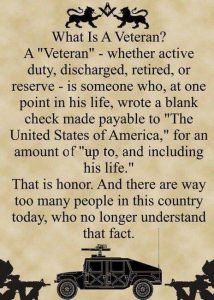 enemy. We even think about them losing their lives. We think about their loved ones back home worrying and praying for their safe return every day. We think about the irony and sometimes stupidity of war, and wonder why we can’t all just get along. People protest the wars, screaming at the soldiers because they did their duty and fought the war as they were ordered to do.
enemy. We even think about them losing their lives. We think about their loved ones back home worrying and praying for their safe return every day. We think about the irony and sometimes stupidity of war, and wonder why we can’t all just get along. People protest the wars, screaming at the soldiers because they did their duty and fought the war as they were ordered to do.
We think about and do so many things concerning war, but just how often to we really thing about the honor and integrity of the men and women who actually go into war, or even stand at the ready, just in case we need them. They know that every time they deploy with their unit, that it could easily end up being the last time they see their family, friends, or their country. They put their lives on hold, missing out on their children’s sporting events, school plays, holidays, birthdays, and even their birth, all to go out and put their lives on the line for people they don’t even know. Now, that’s honor!! Happy Veterans Day to all our veterans, and thank you all for your service. This nation and all it’s people owe you a debt of gratitude that we can never repay. We honor you today. God bless you all.
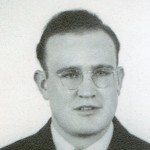
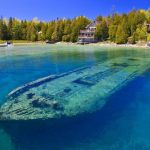 In September of 1975, my husband, Bob Schulenberg and I made a trip to Superior, Wisconsin to visit my Uncle Bill Spencer and his family. Uncle Bill and I had always been close, and it was a trip I thoroughly enjoyed. Part of the trip included driving around the shores of Lake Superior, while Uncle Bill gave us some history of the area, including the many shipwrecks that had occurred in the lake. Lake Superior is the largest fresh water lake in the world, and in reality it is more a sea than a lake. The lake experiences treacherous storms, especially in November when the Winter gales sweep over the it. With a huge shipping industry operating on the lake every year, accidents are bound to happen periodically, especially if a ship is caught out on the lake too late in the season. Listening to Uncle Bill tell us about the ghosts of Lake Superior, as the wrecks were called, and how you could see them beneath the water if you flew over the lake, peeked my curiosity about when and where the ships had lost their battles with the lake.
In September of 1975, my husband, Bob Schulenberg and I made a trip to Superior, Wisconsin to visit my Uncle Bill Spencer and his family. Uncle Bill and I had always been close, and it was a trip I thoroughly enjoyed. Part of the trip included driving around the shores of Lake Superior, while Uncle Bill gave us some history of the area, including the many shipwrecks that had occurred in the lake. Lake Superior is the largest fresh water lake in the world, and in reality it is more a sea than a lake. The lake experiences treacherous storms, especially in November when the Winter gales sweep over the it. With a huge shipping industry operating on the lake every year, accidents are bound to happen periodically, especially if a ship is caught out on the lake too late in the season. Listening to Uncle Bill tell us about the ghosts of Lake Superior, as the wrecks were called, and how you could see them beneath the water if you flew over the lake, peeked my curiosity about when and where the ships had lost their battles with the lake.
Just a month later, on November 10, 1975, while driving around the lake on his way back from a gun show, Uncle Bill experienced the gales of November from the lake shore, not knowing at the time that the SS Edmond Fitzgerald was fighting for its life, in a losing battle on the lake. The ship had made a run for it from Superior, Wisconsin, but found itself in serious trouble the next day. This was not going to be a battle the ship or her 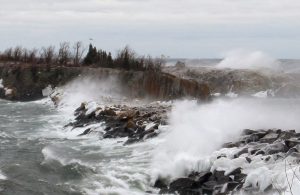 crew would survive. The SS Edmund Fitzgerald had once been the largest and fastest ship on the Great Lakes, at 729 feet in length. First launched in 1958, its service would be cut short that fateful day in 1975.
crew would survive. The SS Edmund Fitzgerald had once been the largest and fastest ship on the Great Lakes, at 729 feet in length. First launched in 1958, its service would be cut short that fateful day in 1975.
The ship left Burlington Northern Railroad Dock, Number 1 at Superior, Wisconsin on November 9th, carrying 26,116 tons of iron ore pellets. The next day it was hit with a storm packing 60 mile per hour winds and waves in excess of 15 feet. Captain Ernest McSorley steered north, trying to make it to safety in Whitefish Bay, but then the radar failed and the storm took out the power at Whitefish Bay taking with it Whitefish Point’s radio beacon. McSorley was traveling blind. The huge wave swept over the ship, and it began taking on water. A ship taking on water is never a good thing, but when you add to that 26,116 tons of iron ore pellets, that ship is in trouble. Another ship, the Anderson stayed in radio contact with the Fitzgerald, trying to help it reach the bay, but to no avail. Just after 7pm on November 10th, 17 miles from Whitefish Bay, the Fitzgerald made its last radio transmission. The ship, sunk lower and lower from the added weight of the water until its bow pitched down into the lake and the vessel was unable to recover. The ship broke in two, either from waves and water or on its way to the bottom, taking with it cargo and crew. None of the 29 men aboard survived.
It’s not hard to imagine why the shipwrecks are called the Ghosts of Lake Superior, because many, if not all of 
 them took with them the men and women who had been their crew. Most of those lost souls are still there in a watery grave, because it is too difficult to recover the bodies. The Edmund Fitzgerald now lies under 530 feet of water, broken in two sections. It is just one of at least 52 ships that litter the bottom of the lake. On July 4, 1995, the ship’s bell was recovered from the wreck, and a replica, engraved with the names of the crew members who perished in this tragedy, was left in its place. The original bell is on display at the Great Lakes Shipwreck Museum at Whitefish Point in Michigan.
them took with them the men and women who had been their crew. Most of those lost souls are still there in a watery grave, because it is too difficult to recover the bodies. The Edmund Fitzgerald now lies under 530 feet of water, broken in two sections. It is just one of at least 52 ships that litter the bottom of the lake. On July 4, 1995, the ship’s bell was recovered from the wreck, and a replica, engraved with the names of the crew members who perished in this tragedy, was left in its place. The original bell is on display at the Great Lakes Shipwreck Museum at Whitefish Point in Michigan.
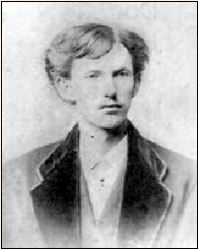 When we think of gunslingers from the old west, a number of names come to mind…among them, Doc Holliday. John Henry “Doc” Holliday was born August 14, 1851 in Griffin, Georgia, to Henry Burroughs Holliday and Alice Jane (McKey) Holliday. When John was just 15 years old, his mother died of Tuberculosis on September 16, 1866. His adopted brother also died of Tuberculosis. In 1870, at the age of 19, Holliday left home for Philadelphia, and on March 1, 1872, he received his Doctor of Dental Surgery degree from the Pennsylvania College of Dental Surgery. Holliday graduated five months before his 21st birthday, so the school held his degree until he turned 21, which was the minimum age required to practice dentistry.
When we think of gunslingers from the old west, a number of names come to mind…among them, Doc Holliday. John Henry “Doc” Holliday was born August 14, 1851 in Griffin, Georgia, to Henry Burroughs Holliday and Alice Jane (McKey) Holliday. When John was just 15 years old, his mother died of Tuberculosis on September 16, 1866. His adopted brother also died of Tuberculosis. In 1870, at the age of 19, Holliday left home for Philadelphia, and on March 1, 1872, he received his Doctor of Dental Surgery degree from the Pennsylvania College of Dental Surgery. Holliday graduated five months before his 21st birthday, so the school held his degree until he turned 21, which was the minimum age required to practice dentistry.
Many people remember Doc Holliday from the gunfight at the OK Corral in Tombstone, Arizona, but prior to that time, he was in Saint Louis, Missouri and Atlanta, Georgia. He started has practice in Saint Louis, but switched to Atlanta less than four months later 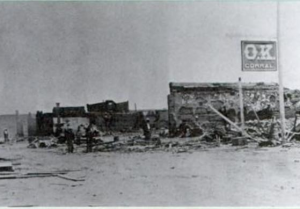 to join a dental practice there. While in Atlanta, Holliday and some friends got into an altercation, and in the end, Holliday went and got a shotgun. He came back and started shooting, either at or over the heads of the other men. Whether or not anyone was killed is up for debate, but Holliday gained a reputation as a gunslinger.
to join a dental practice there. While in Atlanta, Holliday and some friends got into an altercation, and in the end, Holliday went and got a shotgun. He came back and started shooting, either at or over the heads of the other men. Whether or not anyone was killed is up for debate, but Holliday gained a reputation as a gunslinger.
Soon after moving to Atlanta, Holliday developed a bad cough. The doctors told him that he had Tuberculosis. I can’t even begin to imagine how Holliday felt about that diagnosis. He had watched his mother die of that very disease, as well as his adopted brother. Holliday was told he needed to move to a dryer 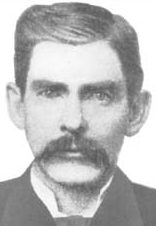 climate, if he wanted to extend his life. He moved to Dallas, Texas. His dental practice could have suffered because of his ill health, or it could have been caused by the fact that he would rather play poker than work on teeth. Holliday was a decent poker player, so he found that it was a pretty good way to make a living. In 1875, Holliday was arrested in Dallas for participating in a shootout.
climate, if he wanted to extend his life. He moved to Dallas, Texas. His dental practice could have suffered because of his ill health, or it could have been caused by the fact that he would rather play poker than work on teeth. Holliday was a decent poker player, so he found that it was a pretty good way to make a living. In 1875, Holliday was arrested in Dallas for participating in a shootout.
Holliday left Dallas and began drifting between booming Wild West towns like Denver, Cheyenne, Deadwood, and Dodge City. He made his living at card tables, with heavy drinking and late night. All of these things were quite aggravating to his Tuberculosis. By 1887, Holliday’s hard life had caught up with him, forcing him to seek treatment in a sanitarium in Glenwood Springs, Colorado. Finally, on this day, November 8, 1887, Doc Holliday, gunslinger, gambler, and occasional dentist, lost his battle with Tuberculosis, just like his mother and adoptive brother before him.
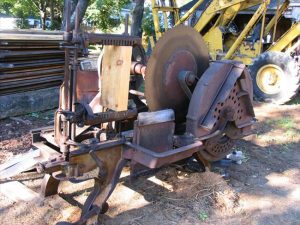 Since I’m not in the manufacturing trade, especially where wooden shingles are concerned, I had no idea that there was a trade called shingle weaving. I would assume that if shingle weaving is still done today, it is probably done by machine, because I would think that this rather dangerous occupation is one that not too many people would voluntarily put themselves into. Shingle weaving, for those who don’t know, was an extremely dangerous process in which the shingle weaver hand-fed pieces of raw wood onto an automated saw. Despite the danger of the profession, the industry was a large one throughout Washington and Oregon and by 1893 Washington state alone had 150 mills which converted Western Red Cedar into shingles and shakes for the roofing and siding of American homes. The workers normally worked ten hour shifts, standing in front of two steel saw blade disks whirling at a speed of two hundred rounds a minute. With his left hand he is feeding blocks of cedar wood into the saw, and with his right hand, he is examining the wood that came out of the left saw for knot holes to be cut out by the saw blade disk in front of him. The worker cannot stop what his right hand and his eyes are doing to see where his left hand is, creating a situation whereby his left hand could easily be cut up or even off, if he doesn’t have a good feel for where his hand is at all times in relation to that left saw blade disk. It doesn’t take much imagination to picture the concerns the workers had.
Since I’m not in the manufacturing trade, especially where wooden shingles are concerned, I had no idea that there was a trade called shingle weaving. I would assume that if shingle weaving is still done today, it is probably done by machine, because I would think that this rather dangerous occupation is one that not too many people would voluntarily put themselves into. Shingle weaving, for those who don’t know, was an extremely dangerous process in which the shingle weaver hand-fed pieces of raw wood onto an automated saw. Despite the danger of the profession, the industry was a large one throughout Washington and Oregon and by 1893 Washington state alone had 150 mills which converted Western Red Cedar into shingles and shakes for the roofing and siding of American homes. The workers normally worked ten hour shifts, standing in front of two steel saw blade disks whirling at a speed of two hundred rounds a minute. With his left hand he is feeding blocks of cedar wood into the saw, and with his right hand, he is examining the wood that came out of the left saw for knot holes to be cut out by the saw blade disk in front of him. The worker cannot stop what his right hand and his eyes are doing to see where his left hand is, creating a situation whereby his left hand could easily be cut up or even off, if he doesn’t have a good feel for where his hand is at all times in relation to that left saw blade disk. It doesn’t take much imagination to picture the concerns the workers had.
On May 1, 1916, the workers decided that they weren’t receiving enough pay for this very dangerous occupation, and the mill owners disagreed, so the Everett Shingle Weavers Union went on strike. The strike was quickly settled, in favor of the mill owners, at all but the Jamison Mill. It was at this point that the Industrial Workers of the World (IWW) got involved. A 1909 IWW strike in Spokane had cost the city over $250,000, a great deal of money at that time, so when the IWW came to Everett, the city government quickly became quite nervous. When IWW organizer and speaker James Rowan arrived in Everett on June 30, 1916, Everett became the home of the IWW’s newest Free Speech Fight. The fight, while starting out relatively peacefully, escalated when Rowan chose the corner of Hewitt and Wetmore, where public speaking was illegal, to begin his work…even though free speech was legal at other corners. I’m sure his plan was to provoke the city government in any way he could, and maybe to bring in the press. Speakers were arrested and released, keeping the jail busy for a month and a half. The delicate balance of the negotiation process continued until August 19, 1916, when violence broke out at the Jamison Mill. It was Strike Breakers against the picketers, which is usually how those things go. The mill owners didn’t have to be involved, because when people ran out of money, they had little choice but to go back to work. Those left, didn’t like the line crossing strike breakers. The police didn’t get involved, because they said the fight was on private property, and so didn’t concern them.
On October 30, all that changed when 41 IWW members came by ferry to Everett, to speak at the now notorious corner of Hewitt and Wetmore. The Sheriff and his deputies beat these men, took them to Beverly Park, and forced them to run through a gauntlet of “law and order” officials, armed with clubs and whips. After that horrific incident, the IWW organized a group of 300 men to board the steamers Verona and Calista from Seattle and head north toward Port Gardner Bay, on November 5 for a free 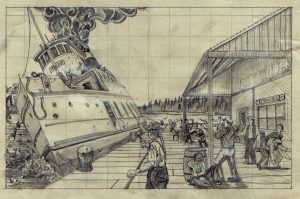 speech rally. The event ended in gun battle now known as the Everett Massacre, in which 5 strikers and 2 vigilantes calling themselves “citizen deputies” were killed and approximately 45 others wounded. The vigilantes met the IWW free speech protesters, who were on the Verona, at the dock. As the gunfire ensued, the men on the Verona ran to the opposite side, almost capsizing it. Some fell off and drown. Few of the men on the Verona had weapons, and so were defenseless. The vigilantes who were inexperienced in this type of fighting, were careless in their aim, and so in the end, many of the vigilantes who were killed or wounded were shot in the back by their own group. The massacre, also known as Everett’s Bloody Sunday, was the bloodiest battle in Pacific Northwest labor history.
speech rally. The event ended in gun battle now known as the Everett Massacre, in which 5 strikers and 2 vigilantes calling themselves “citizen deputies” were killed and approximately 45 others wounded. The vigilantes met the IWW free speech protesters, who were on the Verona, at the dock. As the gunfire ensued, the men on the Verona ran to the opposite side, almost capsizing it. Some fell off and drown. Few of the men on the Verona had weapons, and so were defenseless. The vigilantes who were inexperienced in this type of fighting, were careless in their aim, and so in the end, many of the vigilantes who were killed or wounded were shot in the back by their own group. The massacre, also known as Everett’s Bloody Sunday, was the bloodiest battle in Pacific Northwest labor history.

